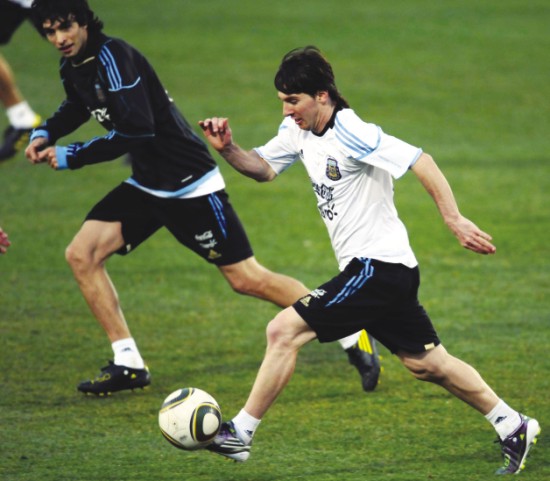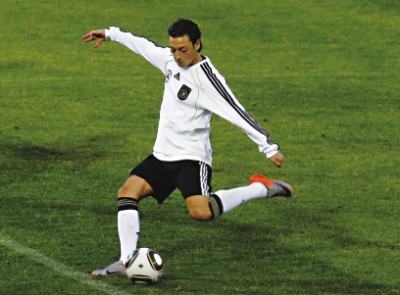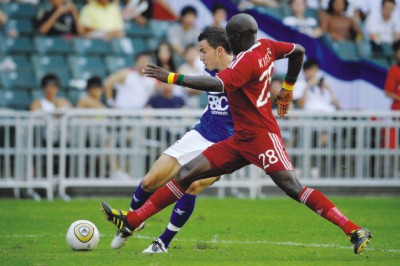
Inside
|
Room to Run IKHTIAR KAZI asks what driving a Ferrari in Dhaka has in common with the World Cup
Who could have predicted that Brazil and Argentina would be out of the World Cup within a day of each other, without even making it to the semi-finals? That's equivalent to Federer or Nadal losing in straight sets at a very early stage in Wimbledon, or the L.A. Lakers not making it past Oklahoma City in the NBA playoffs. I am sure all the odds makers in Las Vegas (and quant shops focused on this billion-dollar industry) were in disarray with the departure of Brazil and Argentina. But I was ecstatic with the shakeup (quite frankly I was tired of hearing "who do you support, Argentina or Brazil?" As if the other 30 teams were chopped liver.) In general, I am a contrarian and fan of underdog teams, so I had hoped Brazil and Argentina would lose. To celebrate Germany's victory over Argentina and to rub it in to the losers (the supporters) I thought I would take a ride down the strip, i.e. Gulshan Avenue (from Gulshan 1 to 2 circle), waving the German flag in my red Ferrari Enzo. (Which by the way I didn't buy with "black" money. I bought it with genuine clean "white" money. Honest). I brought along my vuvuzela and thought I would blow the horn anytime I saw a Brazilian or Argentinean flag (or anyone I deemed to be a fan of these teams). I realised that the sound of vuvuzela would annoy everyone, and I would collectively be punishing those who don't even care about football, but I justified my irrational behavior ("irrational exuberance" in Alan Greenspan/Robert Schiller parlance) with "Hey, it's the World Cup!" Of the 12-cylinders in my Ferrari, I imagine not even one fired up even 10% of its full potential. Although the Ferrari Enzo can go 0 to 60 in 3 seconds, I barely reached 10 mph (rickshaws and pedestrians zoomed past me). Frustrated by this, I made an illegal S-turn and drove towards oncoming traffic (S-turns are similar to U-turns, but instead of going with the flow of traffic, you are going against the traffic. In no way am I advocating this behaviour). I waved politely to the police officer in charge of the intersection (who happened to be on his mobile phone, probably talking to his broker about the next big IPO on DSE) and headed back home. You may be wondering how driving a Ferrari in Dhaka city has anything to do with football and the World Cup. The answer: Everything! The engineering of the Ferrari Enzo is second to none (only 400 of these bad boys exist in the world) Some even call the Enzo, one of the top 10 cars ever built. The Enzo was built using Formula One technology, has a carbon-fibre body, F1-style electro-hydraulic shift transmission, and carbon fibre inforced silicon carbide ceramic composite disc brakes. After a down-force of 775 kg is reached at 356 km/h (221 mph) the rear wing is actuated by computer to maintain that down-force. Yes, it is so fast that it can fly (and hence the need for the rear wing to keep it down to earth)! But not in Dhaka city! Whether you drive a Ferrari or Corolla X, it ends up being the same; you are not able to unleash the true potential of the Ferrari. The Ferrari Enzo in Dhaka is equivalent to Ronaldo, Messi or Kaka on the football field. They couldn't dazzle us, because of traffic (yes, traffic on the football field). Many critics have unfairly said that these super hyped stars of football never shone on the biggest stage. But is it Ronaldo or Messi's fault? I don't think so at all. Twenty-two players in a 100 x 64 metre field is simply too crowded. There is not enough space for these great athletes to demonstrate their true talent. Sure, you see some fancy footwork, but they are rarely able to score (or pass the ball that leads to a goal).
Would you want to see a highlight of Michael Jordan, Kobe Bryant or LeBron James dribbling the basketball behind their back, flying through the air, spinning 360 degrees to miss a dunk? I don't think so. A missed dunk winds up on the late night comedy routine, not ESPN. It's not worth the highlight film if it doesn't lead to a point (I realise you tell your young impressionable kids, it's the effort that counts in life, not if you win, lose or score but who are you fooling? WC is not a Mickey Mouse event, it's a billion dollar capitalist venture). Messi, dubbed "the greatest football player in the 2010 World Cup" before the WC began, never scored (although he dazzled us with some crazy footwork ... yeah yeah yeah). Which leads us to the reform we must have in football (I am not talking about instant replays and sensor imbued balls -- those are obvious no-brainer changes, which FIFA has yet to fully embrace). I realise that what I am about to write will be considered sacrilegious to those who are purists, when it comes to the sanctity of their beloved game of football, but I will write it anyway in the hope that a greater good will be achieved. The Reform: We need to cut down the number of players from 11 to 7. We need to cut down traffic in the field to bring more excitement to the game, but most importantly to better differentiate the good teams versus the best team. I realize the negative implication of my policy may lead to higher unemployment in the football profession, but at least those affected will be able to watch the much improved and more entertaining "Football 2.0" (made for the 21st century). Let me just point out the obvious observation. In most of the World Cup games, the scores have been something like 0-0, 1-0, 1-1 or 2-1. I was tempted to run a statistical analysis and plot things out on an X - Y chart, and make my argument sound "scientific," but I thought I'd rather approach the reader's sensibility to common sense. After 90 minutes (in many cases over 120 minutes), can you really differentiate two teams by one point? (The philosophical meaning of scoring in the context of football is same as it is in life). In the game of football there are not any partial points, so it is not the case that a collection of good efforts necessarily leads to something (as is the case in American Football -- you can score a touchdown for six points. If you cannot score a touchdown but are close enough to the goal, you can score a field goal for three points; and there are various ways to earn one or two points. In essence, your effort can count for something). Since the game of football is a game of zeros and ones (either you score or you don't; and rarely does one score, if I may add), differentiating between excellent, good and bad teams become very difficult when it's just a question of one point.
In many cases, the solo point is "earned" by accident. This complicates the matter even more. The purists may say nothing happens by accident (sounds very Freud-like), but rather each point is earned through great execution of strategy. True, better teams and players have more "accidents" in their favour. But if you look at it statistically (and I realise I am trying to argue to your common sense sensibility), ask yourself how many times there are corner kicks and how often does it lead to a point. Very rarely! So by chance if you are able to head the ball at the right time, you score, and often the single point leads to victory. When the margin of error is greater than the result itself, you cannot make a definitive conclusion on any matter (in this case the better football team). This has been the case in the WC games. If, however, the ratio of corner kicks to points scored was very high, then one could argue that the point was due to execution and not luck. So, what's the solution? Innovate -- cut down the number of players per team from 11 to 7. How will this change everything? If we were to reduce the number of players, the field would open up enough so that you would see Messi show us what he is really capable of. Not only would he score a few more points, but score with style and pizzazz. The 12-cylinder Ferrari engine inside Ronaldo would fire up and he would electrify us with elaborate footwork and drive through the defense of the best teams (instead of tripping and falling, as is the case when there is too much traffic on in the field). I realise some of you are already coming up with counter arguments, such as; the game of football is a game of defense. So you are not in favour of having a very high scoring game. I am not either. But do you remember the Germany vs. England game? The score was 4-1 (which is a rarity). Wasn't that more exciting than the typical one-point game? I am not sure exactly what the average score will be when we lower the number of players, but I know for sure it will be more exciting. (If I need to remind you, we are in "Digital Bangladesh" age. We don't have time to sit around for 90 minutes to see one highlight. We need instant gratification).
The great players will actually be able to score and pass (and not be stuck in traffic). Just one last point on this, if you are still unconvinced that lowering the number of players makes sense. Imagine if there were 40 players on the field. I am sure you will agree, 99% of time the score would be 0-0. There simply would be too much traffic, and no one would be able to score (it is the traffic and not the hard-nosed defense that would lead to the 0-0 outcome). We would not be able to fairly differentiate who among the teams was actually better and more deserving of the winner's trophy (and of course our adoration). Some of you may be wondering why 7 players. Why not 6 or 8? I don't want to get too deep into mathematics, religion and history of civilizations, but all these factors play a role. In mathematics, there are "happy," "safe" and "lucky" numbers. The number 7 fits the criteria of all three. It's no coincidence that the football field dimension is very close to the mathematical "Golden Ratio." The number 7 is referred to as a "lucky number" even in Chinese culture; it is considered sacred, holy and magical in Egyptian mythology. In Abrahamic faiths, Hinduism, Buddhism, and Japanese Mythology, the number 7 plays a very significant role. These are all good reasons to have seven players on a team, but the most important reason is, it is most optimal based on the dimension of the field. Players will be able to fully demonstrate their offensive and defensive prowess; which translates into maximum entertainment for us, the devoted viewers. What's in it for the players, the sponsors, corporations, and governments (democracies to dictators) who are incestuously married to each other -- more money! (Better product leads to more consumers, which leads to more revenue).
Whoever wins the World Cup, I think it is fair to say that they are a good football team. Of the 32 teams that play in the WC, those in the lower rung will probably not win the trophy. But I am hesitant to say, that the best team will actually win the World Cup. The irony here is that although I had hoped for Brazil and Argentina to lose (since I support underdog teams). The chance of Brazil or Argentina winning the WC would have been higher had there been fewer players on the field. In this year's WC, Spain beat the Netherlands to take home their first WC trophy. I had hoped that my hypothesis would not hold true in this final game of 2010. I had hoped that I would not have to wait until the near end (in extra time, in the 116th minute) to see that one elusive highlight. Spain won the trophy the same way it won the last four games, with a score of 1-0. The goal in the 116th minute came off a turnover by the Dutch defense; midfielder Andres Iniesta (Spain) was able to sneak in and grab the pass to score the winning goal. Iniesta will reach mythical proportions for his "achievement" and probably be mentioned in the same breath as Picasso, Cervantes, and Gaudi. The 2010 WC featured 31 one-goal decisions out of 64 matches (four more than the previous high set in 2002). While the game roared past the 113th minute, I thought it would go to a penalty shootout, which as exhilarating as it may be, I do not like. I like close nail biting games (sprinkled with few points), but to win a scoreless game with penalty kicks just does not seem right (especially if the beautiful game is played every four years). In the end, I think people are drawn to football because in so many ways it is like life. It is a game where the chance of being at the right place at the right time, and luck play such a critical role. There is a probability, just like a lottery, anyone can win -- even the underdog! (Don't get me wrong, football players are some of the most skillful athletes). Lastly, the reform I am suggesting may benefit Bangladesh the most. Instead of having to find 11 great players from a population pool of 165 million, the search can be for just seven. That should be an easier challenge! I realise FIFA is not known to be full of the most innovative bunch of people, so chance of immediate reform is low, but I would love to say "I was right" 50 years from now. Hey, in this global economy, where competition is fierce, those who do not innovate, and have a vision for the long horizon, will simply lose (I will write more about innovation and related topics in future articles) By the way, if you are a Brazil or Argentina fan (or for that matter, Spain or Netherlands); please don't rabble-rouse like it's hartal, and throw a rock at my Ferrari (that I paid for with "clean" cash ... wink wink)! Ikhtiar Kazi is an Economist/Capital Markets Professional turned Sports Philosopher.
|




